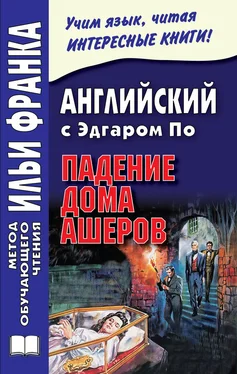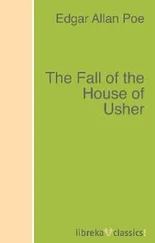
 I learned, moreover, at intervals, and through broken and equivocal hints, another singular feature of his mental condition. He was enchained by certain superstitious impressions in regard to the dwelling which he tenanted, and whence, for many years, he had never ventured forth – in regard to an influence whose supposititious force was conveyed in terms too shadowy here to be re-stated – an influence which some peculiarities in the mere form and substance of his family mansion, had, by dint of long sufferance, he said, obtained over his spirit – an effect which the physique of the gray walls and turrets, and of the dim tarn into which they all looked down, had, at length, brought about upon the morale of his existence.
I learned, moreover, at intervals, and through broken and equivocal hints, another singular feature of his mental condition. He was enchained by certain superstitious impressions in regard to the dwelling which he tenanted, and whence, for many years, he had never ventured forth – in regard to an influence whose supposititious force was conveyed in terms too shadowy here to be re-stated – an influence which some peculiarities in the mere form and substance of his family mansion, had, by dint of long sufferance, he said, obtained over his spirit – an effect which the physique of the gray walls and turrets, and of the dim tarn into which they all looked down, had, at length, brought about upon the morale of his existence.
He admitted, however, although with hesitation(он признал, впрочем, хотя и с колебанием) , that much of the peculiar gloom which thus afflicted him could be traced to a more natural and far more palpable origin(что многое из = что во многом /корни/ той особенной мрачности, которая так охватила его, могли быть прослежены до более естественного и гораздо более ощутимого источника; far – далеко; зд.: гораздо ) – to the severe and long-continued illness(до суровой и долго продолжавшейся болезни) – indeed to the evidently approaching dissolution(по правде говоря, до очевидно приближающейся гибели) – of a tenderly beloved sister(нежно любимой сестры) – his sole companion for long years(его единственного товарища долгие годы) – his last and only relative on earth(его последнего и единственного родича на земле) . “Her decease,” he said, with a bitterness which I can never forget(ее кончина, сказал он с горечью, которую я не могу забыть) , “would leave him (him the hopeless and the frail) the last of the ancient race of the Ushers(оставит его, его, безнадежного и хрупкого, последним из древнего рода Ашеров) .”

 He admitted, however, although with hesitation, that much of the peculiar gloom which thus afflicted him could be traced to a more natural and far more palpable origin – to the severe and long-continued illness – indeed to the evidently approaching dissolution – of a tenderly beloved sister – his sole companion for long years – his last and only relative on earth. “Her decease,” he said, with a bitterness which I can never forget, “would leave him (him the hopeless and the frail) the last of the ancient race of the Ushers.”
He admitted, however, although with hesitation, that much of the peculiar gloom which thus afflicted him could be traced to a more natural and far more palpable origin – to the severe and long-continued illness – indeed to the evidently approaching dissolution – of a tenderly beloved sister – his sole companion for long years – his last and only relative on earth. “Her decease,” he said, with a bitterness which I can never forget, “would leave him (him the hopeless and the frail) the last of the ancient race of the Ushers.”
While he spoke, the lady Madeline (for so was she called)(пока он говорил, леди Маделин, ибо так ее звали; to call – звать, называть ) passed slowly through a remote portion of the apartment(медленно прошла через отдаленную часть комнаты) , and, without having noticed my presence, disappeared(и, не заметив моего присутствия, исчезла; without – без ) . I regarded her with an utter astonishment not unmingled with dread(я смотрел на нее с крайней пораженностью, смешанной с ужасом: «не не-смешанной») – and yet I found it impossible to account for such feelings(и все же я нашел невозможным объяснить такие чувства; to find – найти ) . A sensation of stupor oppressed me(чувство оцепенения охватило меня) , as my eyes followed her retreating steps(пока мои глаза следили за ее удаляющимися шагами).

 While he spoke, the lady Madeline (for so was she called) passed slowly through a remote portion of the apartment, and, without having noticed my presence, disappeared. I regarded her with an utter astonishment not unmingled with dread – and yet I found it impossible to account for such feelings. A sensation of stupor oppressed me, as my eyes followed her retreating steps.
While he spoke, the lady Madeline (for so was she called) passed slowly through a remote portion of the apartment, and, without having noticed my presence, disappeared. I regarded her with an utter astonishment not unmingled with dread – and yet I found it impossible to account for such feelings. A sensation of stupor oppressed me, as my eyes followed her retreating steps.
When a door, at length, closed upon her(когда дверь наконец закрылась за ней) , my glance sought instinctively and eagerly the countenance of the brother(мой взгляд искал = обратился инстинктивно и жадно к лицу брата) – but he had buried his face in his hands(но он закрыл лицо руками: «похоронил/зарыл») , and I could only perceive that a far more than ordinary wanness had overspread the emaciated fingers(и я мог лишь заметить, что бледность более обычной покрыла истощенные = странно тонкие пальцы) through which trickled many passionate tears(между которыми струились обильные, вызванные большим чувством: «страстные» слезы; to trickle – течь тонкой струйкой, сочиться; капать ).

 When a door, at length, closed upon her, my glance sought instinctively and eagerly the countenance of the brother – but he had buried his face in his hands, and I could only perceive that a far more than ordinary wanness had overspread the emaciated fingers through which trickled many passionate tears.
When a door, at length, closed upon her, my glance sought instinctively and eagerly the countenance of the brother – but he had buried his face in his hands, and I could only perceive that a far more than ordinary wanness had overspread the emaciated fingers through which trickled many passionate tears.
The disease of the lady Madeline had long baffled the skill of her physicians(недуг леди Маделин долго ставил в тупик умение ее врачей) . A settled apathy(устойчивая апатия) , a gradual wasting away of the person(постепенное увядание личности; to waste away – чахнуть, увядать; to waste – тратить попусту; чахнуть, истощаться; away – прочь ) , and frequent although transient affections of a partially cataleptical character(и частые, хоть и кратковременные приступы отчасти каталептического характера; affection – зд.: повреждение, болезнь, поражение ) , were the unusual diagnosis(были /ее/ необычным диагнозом).
Читать дальше
Конец ознакомительного отрывка
Купить книгу


 I learned, moreover, at intervals, and through broken and equivocal hints, another singular feature of his mental condition. He was enchained by certain superstitious impressions in regard to the dwelling which he tenanted, and whence, for many years, he had never ventured forth – in regard to an influence whose supposititious force was conveyed in terms too shadowy here to be re-stated – an influence which some peculiarities in the mere form and substance of his family mansion, had, by dint of long sufferance, he said, obtained over his spirit – an effect which the physique of the gray walls and turrets, and of the dim tarn into which they all looked down, had, at length, brought about upon the morale of his existence.
I learned, moreover, at intervals, and through broken and equivocal hints, another singular feature of his mental condition. He was enchained by certain superstitious impressions in regard to the dwelling which he tenanted, and whence, for many years, he had never ventured forth – in regard to an influence whose supposititious force was conveyed in terms too shadowy here to be re-stated – an influence which some peculiarities in the mere form and substance of his family mansion, had, by dint of long sufferance, he said, obtained over his spirit – an effect which the physique of the gray walls and turrets, and of the dim tarn into which they all looked down, had, at length, brought about upon the morale of his existence.



![Эдгар По - Падение дома Ашеров [сборник]](/books/30677/edgar-po-padenie-doma-asherov-sbornik-thumb.webp)







